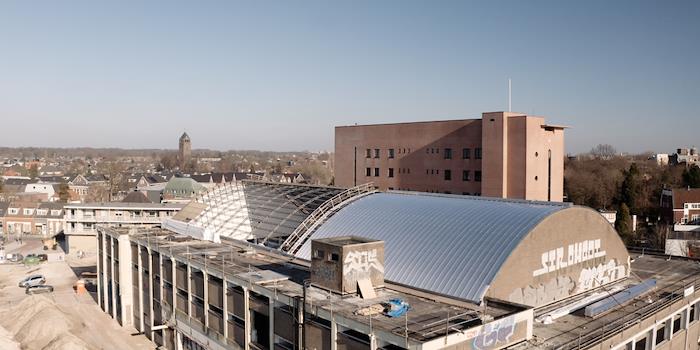In short
- The changing climate also affects our country. Saxion and several partners are responding to this by purifying groundwater and rainwater so that it is suitable for drinking.
- The old cellars in De Melkhal in Enschede are big enough to store three million litres of water. The water surplus in the city can thus be stored there and be pumped up and filtered when necessary.
Global Goal

Everything just falls into place sometimes. There is someone that has a great idea and manages to make everyone enthusiastic about it, in such cases. Ruben Timmers, a researcher at Saxion’s International Water Technology department, has already led some smaller projects and he now works on Tech for Future research project ‘Melkhal’ in Enschede. The official name: ‘OneStep NF Decentralised Water Enschede’. Everything will come together on the site on the edge of the city centre that was originally used for processing dairy: users and residents will be supplied with purified groundwater and rainwater for drinking and with ‘grey water’ for flushing the toilet.
When Timmers heard that a project developer wanted to build apartments on the site and convert the existing Melkhal into a multifunctional building with a supermarket, restaurant, gym, offices and a hotel, among other things, he realised that the building also has large water basins in the cellars of the building. These basins have considerable storage capacity; three million litres to be precise. This was originally used as a cold water reservoir for dairy cooling processes, among other things. Enschede also struggles with high groundwater levels in some places, and this water is pumped away as quickly as possible. Relatively clean water ‘just’ disappears into the sewers, in other words. These two things combined prompted Timmers to come up with a plan. “Our research group wants to contribute to making the world more sustainable. We want to give people the necessary tools to respond to this. I talked to the project developer and he was very enthusiastic about it. He was already planning to use rainwater as greywater, but we wanted to go a step further so that drinking water would ‘just’ come from the neighbourhood. All according to the Dutch quality standard, which is leading worldwide.”
Related articles
“We are working towards a blueprint for decentralised water purification from locally available sources as part of this project. We have a pilot site with a test setup in which we can constantly monitor and guarantee the water quality, all in real-time. There is a lot of enthusiasm and the opportunities are amazing, so it is the joint ambition of the partners to supply the Melkhal and the new apartments with local water only, by reusing rainwater and excess groundwater.”
Many partners have joined the project developer and Saxion to make this project a success and a template for the rest of the world. Vitens and NF Filtration for example, as well as the municipality of Enschede, Siers Infraconsult, Jotemwater treatment, the NTP group and Vincent Spikker. The Vechtstromen water board is also very interested in the process.
“It is appalling that having clean and sufficient water is a pressing issue worldwide. I am grateful to work on solutions for current and future challenges that we face in the world with these amazing partners. Did you know that 75% of all jobs worldwide depend on water? Not necessarily drinking water, but as cooling or process water, for example. Water is important for everything. Developments in the water transition are taking place at a rapid pace. I think we can make a difference in the world with the technology that we have in Twente.”
Timmers shows the enormous water supply underneath the Melkhal. It is being investigated if this water can still be used, but, certainly, water from the neighbourhood will soon be stored in the cellars. “Rainwater and excess groundwater will be brought in through pipes and stored here”, he says. “Our calculations show that we can easily meet the needs of the users.”

Related articles
The research continues while the construction workers are working. Only a few students were involved the Melkhal in the past six months, but that has now increased to between 35 and 40. They are researching sources in Roombeek and at the Ariënsplein, since a lot of water comes from there. Or they work on Life Cycle Analyses of decentralised systems to compare them with the current central water supply. Other civil engineering students are researching pipes”, he says.
More money is still needed to realise the ambition and to supply all buildings with local water only. “We could start supplying greywater tomorrow and drinking water the day after if we wanted to. But we need money for the treatment plant and for laying the pipes. The partners have already pledged funds, but that is not enough. “It is great that everything is coming together: research, education, technology and social interests. I know for sure that, besides the current partners, more parties will want to join us so that the project can be continued on a much larger scale. Locally, that is, because the intention is still to reuse water from the neighbourhood.”
Date: 15 September 2021 |
Source of tekst: Saxion |
Author: Maaike Thüss





